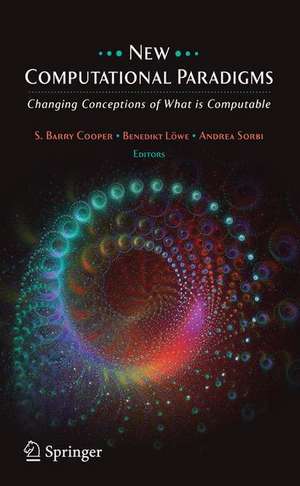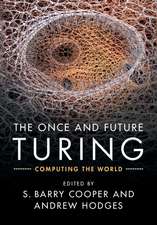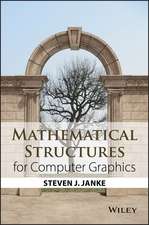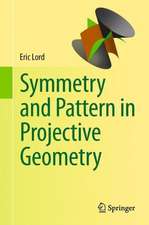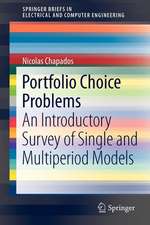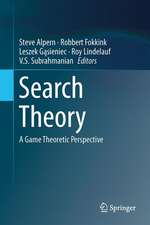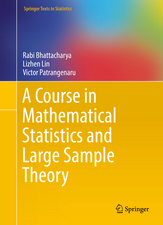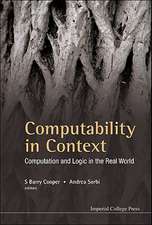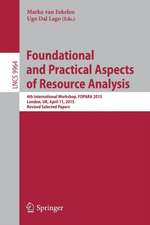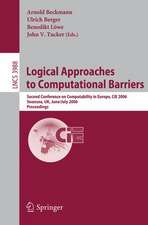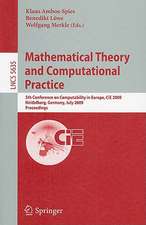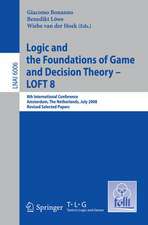New Computational Paradigms: Changing Conceptions of What is Computable
Editat de S. B. Cooper, Benedikt Löwe, Andrea Sorbien Limba Engleză Hardback – 12 dec 2007
This book examines new developments in the theory and practice of computation from a mathematical perspective, with topics ranging from classical computability to complexity, from biocomputing to quantum computing. The book opens with an introduction by Andrew Hodges, the Turing biographer, who analyzes the pioneering work that anticipated recent developments concerning computation’s allegedly new paradigms. The remaining material covers traditional topics in computability theory such as relative computability, theory of numberings, and domain theory, in addition to topics on the relationships between proof theory, computability, and complexity theory. New paradigms of computation arising from biology and quantum physics are also discussed, as well as the computability of the real numbers and its related issues.
This book is suitable for researchers and graduate students in mathematics, philosophy, and computer science with a special interest in logic and foundational issues. Most useful to graduate students are the survey papers on computable analysis and biological computing. Logicians and theoretical physicists will also benefit from this book.
| Toate formatele și edițiile | Preț | Express |
|---|---|---|
| Paperback (1) | 1000.70 lei 6-8 săpt. | |
| Springer – 29 oct 2010 | 1000.70 lei 6-8 săpt. | |
| Hardback (1) | 1006.48 lei 6-8 săpt. | |
| Springer – 12 dec 2007 | 1006.48 lei 6-8 săpt. |
Preț: 1006.48 lei
Preț vechi: 1258.10 lei
-20% Nou
Puncte Express: 1510
Preț estimativ în valută:
192.62€ • 200.35$ • 159.01£
192.62€ • 200.35$ • 159.01£
Carte tipărită la comandă
Livrare economică 14-28 aprilie
Preluare comenzi: 021 569.72.76
Specificații
ISBN-13: 9780387360331
ISBN-10: 0387360336
Pagini: 557
Ilustrații: XIV, 560 p.
Dimensiuni: 155 x 235 x 33 mm
Greutate: 0.95 kg
Ediția:2008
Editura: Springer
Colecția Springer
Locul publicării:New York, NY, United States
ISBN-10: 0387360336
Pagini: 557
Ilustrații: XIV, 560 p.
Dimensiuni: 155 x 235 x 33 mm
Greutate: 0.95 kg
Ediția:2008
Editura: Springer
Colecția Springer
Locul publicării:New York, NY, United States
Public țintă
ResearchCuprins
The Turing Model of Computation and its Applications to Logic, Mathematics, Philosophy, and Computer Science.- Alan Turing, Logical and Physical.- Computability and Numberings.- Computation as Conversation.- Computation Paradigms in Light of Hilbert's Tenth Problem.- Elementary Algorithms and Their Implementations.- Applications of the Kleene–Kreisel Density Theorem to Theoretical Computer Science.- Church Without Dogma: Axioms for Computability.- Computability on Topological Spaces via Domain Representations.- On the Power of Broadcasting in Mobile Computing.- Logic, Algorithms and Complexity.- The Computational Power of Bounded Arithmetic from the Predicative Viewpoint.- Effective Uniform Bounds from Proofs in Abstract Functional Analysis.- Effective Fractal Dimension in Algorithmic Information Theory.- Metamathematical Properties of Intuitionistic Set Theories with Choice Principles.- New Developments in Proofs and Computations.- Models of Computation from Nature.- From Cells to (Silicon) Computers, and Back.- Computer Science, Informatics, and Natural Computing—Personal Reflections.- Computable Analysis and Real Computation.- A Survey on Continuous Time Computations.- A Tutorial on Computable Analysis.- A Continuous Derivative for Real-Valued Functions.- Infinite Time Computable Model Theory.
Recenzii
From the reviews:
“It is addressed to researcher and graduate students … . All contributions to the book have been rigorously refereed, and the standards with respect to layout, references … are high. … This is a piece of excellent pedagogical work. The paper is hereby recommended. … I personally find very readable and informative. … I enjoyed reading these papers, and I assume they are all right when we take them for what they are … .” (Lars Kristiansen, Studia Logica, Vol. 97, 2011)
“It is addressed to researcher and graduate students … . All contributions to the book have been rigorously refereed, and the standards with respect to layout, references … are high. … This is a piece of excellent pedagogical work. The paper is hereby recommended. … I personally find very readable and informative. … I enjoyed reading these papers, and I assume they are all right when we take them for what they are … .” (Lars Kristiansen, Studia Logica, Vol. 97, 2011)
Textul de pe ultima copertă
In recent years, classical computability has expanded beyond its original scope to address issues related to computability and complexity in algebra, analysis, and physics. The deep interconnection between "computation" and "proof" has originated much of the most significant work in constructive mathematics and mathematical logic of the last 70 years. Moreover, the increasingly compelling necessity to deal with computability in the real world (such as computing on continuous data, biological computing, and physical models) has brought focus to new paradigms of computation that are based on biological and physical models. These models address questions of efficiency in a radically new way and even threaten to move the so-called Turing barrier, i.e. the line between the decidable and the un-decidable.
This book examines new developments in the theory and practice of computation from a mathematical perspective, with topics ranging from classical computability to complexity, from biocomputing to quantum computing. The book opens with an introduction by Andrew Hodges, the Turing biographer, who analyzes the pioneering work that anticipated recent developments concerning computation’s allegedly new paradigms. The remaining material covers traditional topics in computability theory such as relative computability, theory of numberings, and domain theory, in addition to topics on the relationships between proof theory, computability, and complexity theory. New paradigms of computation arising from biology and quantum physics are also discussed, as well as the computability of the real numbers and its related issues.
This book is suitable for researchers and graduate students in mathematics, philosophy, and computer science with a special interest in logic and foundational issues. Most useful to graduate students are the survey papers on computable analysis and biological computing. Logicians and theoretical physicists will also benefit fromthis book.
This book examines new developments in the theory and practice of computation from a mathematical perspective, with topics ranging from classical computability to complexity, from biocomputing to quantum computing. The book opens with an introduction by Andrew Hodges, the Turing biographer, who analyzes the pioneering work that anticipated recent developments concerning computation’s allegedly new paradigms. The remaining material covers traditional topics in computability theory such as relative computability, theory of numberings, and domain theory, in addition to topics on the relationships between proof theory, computability, and complexity theory. New paradigms of computation arising from biology and quantum physics are also discussed, as well as the computability of the real numbers and its related issues.
This book is suitable for researchers and graduate students in mathematics, philosophy, and computer science with a special interest in logic and foundational issues. Most useful to graduate students are the survey papers on computable analysis and biological computing. Logicians and theoretical physicists will also benefit fromthis book.
Caracteristici
Explores new developments in the theory and practice of computation from a mathematical perspective Includes topics ranging from classical computability to complexity, biocomputing, and quantum computing Offers content that appeals to specialists and non-specialists alike Features contributors who are prominent scholars and internationally known specialists Includes supplementary material: sn.pub/extras
